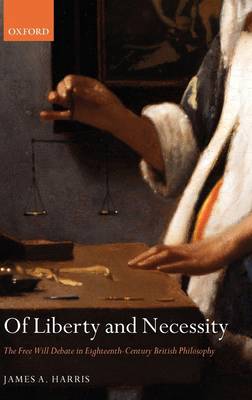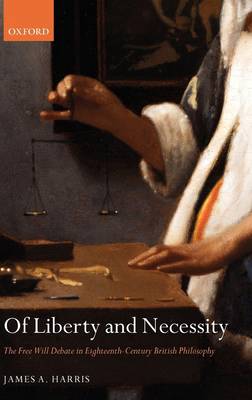
- Afhalen na 1 uur in een winkel met voorraad
- Gratis thuislevering in België vanaf € 30
- Ruim aanbod met 7 miljoen producten
- Afhalen na 1 uur in een winkel met voorraad
- Gratis thuislevering in België vanaf € 30
- Ruim aanbod met 7 miljoen producten
Zoeken
Of Liberty and Necessity
The Free Will Debate in Eighteenth-Century British Philosophy
James A Harris
€ 257,95
+ 515 punten
Uitvoering
Omschrijving
The eighteenth century was a time of brilliant philosophical innovation in Britain. In Of Liberty and Necessity James A. Harris presents the first comprehensive account of the period's discussion of what remains a central problem of philosophy, the question of the freedom of the will. He offers new interpretations of contributions to the free will debate made by canonical figures such as Locke, Hume, Edwards, and Reid, and also discusses in detail the arguments of some less familiar writers. Harris puts the eighteenth-century debate about the will and its freedom in the context of the period's concern with applying what Hume calls the "experimental method of reasoning" to the human mind. His book will be of substantial interest to historians of philosophy and anyone concerned with the free will problem.
Specificaties
Betrokkenen
- Auteur(s):
- Uitgeverij:
Inhoud
- Aantal bladzijden:
- 280
- Taal:
- Engels
- Reeks:
Eigenschappen
- Productcode (EAN):
- 9780199268603
- Verschijningsdatum:
- 11/08/2005
- Uitvoering:
- Hardcover
- Formaat:
- Ongenaaid / garenloos gebonden
- Afmetingen:
- 156 mm x 234 mm
- Gewicht:
- 576 g

Alleen bij Standaard Boekhandel
+ 515 punten op je klantenkaart van Standaard Boekhandel
Beoordelingen
We publiceren alleen reviews die voldoen aan de voorwaarden voor reviews. Bekijk onze voorwaarden voor reviews.











